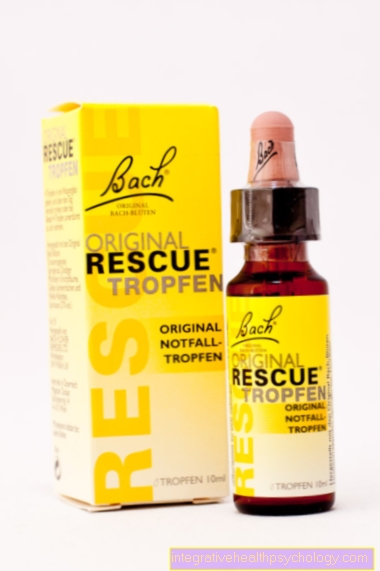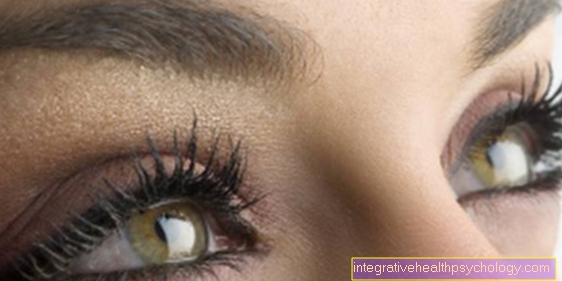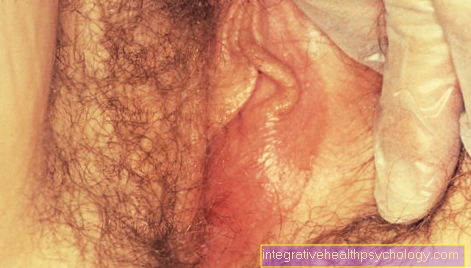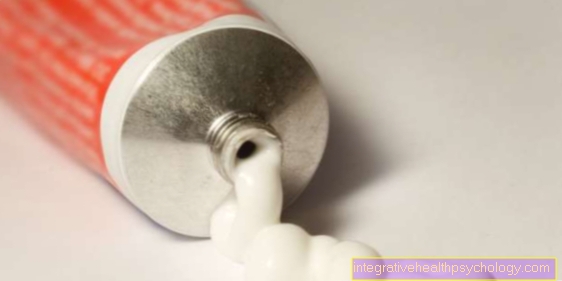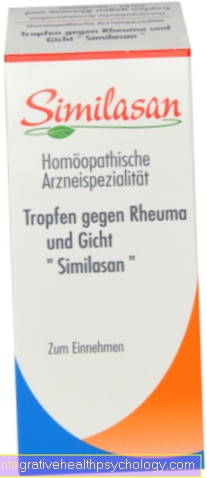How can you fight bad breath successfully?
introduction
Chronic bad breath is called in medicine Halitosis designated. More than 25% of the population suffer from this condition, which causes a foul smelling odor from the mouth and nose.
In principle, local causes (affecting the mouth and throat) can be distinguished from systemic causes for the development. These include various general diseases, e.g. Diabetes or various diseases of the nose and throat such as a sore throat.
Read also under: Eliminate bad breath

The use of certain medications (e.g. antibiotics) can also change the oral flora in such a way that bad breath occurs.
The most common cause of bad breath is the build-up of bacteria in the mouth and tongue. Some authors refer to these as putrefactive bacteria. There is usually a balance of beneficial and harmful bacteria within the oral flora. Both have different functions in the mouth area.
Bacteria feed on protein-rich and sugary food residues. They are mainly found in places in the mouth that are difficult to clean such as the edges of the gums, between the teeth, on the tongue or in the cheek area. The decomposition of the food residues releases sulfur-containing compounds, which lead to bad breath.
Find out more at: Bad breath- what are the causes?
Which products can be used to combat bad breath?
According to the manufacturer, the products listed below are suitable for daily use.
Listerine®
The Listerine® tooth rinse is one of many products against bad breath that can be purchased in stores. These are a number of different types of mouthwash that can be used on a daily basis. They are also intended to flush hard-to-reach areas (e.g. interdental spaces), which reduces the formation of harmful bacteria and prevents bad breath from occurring. More information on the active ingredients and the various products can be found on the manufacturer's homepage (www.listerine.de).
Odol®
Odol® has also developed various types of mouth rinsing solutions and mouthwashes for daily use. Here, fluoride-containing components are supposed to inhibit the rebuilding of harmful bacteria and protect the teeth from tooth decay. At the same time, the avoidance of alcoholic substances and the use of mint aroma should ensure fresh breath. More detailed information about the composition and effects can be found at www.odol.de.
Meridol®
To combat bad breath, Meridol® has developed special types of mouthwashes and toothpastes. These are said to provide effective protection against bacteria on the tongue and teeth that cause bad breath. According to the manufacturer, the effectiveness is based on an active ingredient combination of amine fluoride / tin fluoride and zinc latate. More details can be found on the manufacturer's website (www.meridol.de).
You can also find out more at: Fluoridation of teeth
Fight bad breath with mouthwash
Mouthwash and mouthwash solutions can be used for short periods of time to combat bad breath. The unpleasant smells are covered by the natural scent of the mouthwash and mouthwash solutions.
However, products that also have an antiseptic or antibacterial effect should not be used over a long period of time, as they destroy the beneficial bacteria as well as harmful bacteria. As a result, they can unbalance the oral flora when used over a long period of time.
In addition, products based on chlorhexidine lead to discoloration of the teeth. If the actual causes for the development of bad breath are not treated, putrefactive bacteria will develop again after stopping mouthwash and mouthwash solutions.
Read more about this at: Chlorhexidine
Which home remedies help against bad breath?
Various home remedies have proven effective for treating bad breath, including various medicinal herbs with an antibacterial (bacteria-killing) effect. Above all, parsley and mint should be mentioned. Both have a high proportion of chlorophyll (plant pigment). Due to the high chlorophyll content, they prevent the development of putrefactive bacteria and can thus optimize the oral environment.
In addition to these two, there are a variety of medicinal herbs that are able to improve breath. These include e.g. Fennel, myrrh, chamomile, eucalyptus, sage or ginger. Their essential oils have an antibacterial effect and thus prevent the development of bad breath, inflammation of the gums or tooth decay. It can be used in the form of teas, oils, toothpaste, chewing gum or in natural form (by chewing leaves).
The seeds of fenugreek and cardamom are also good for improving breath.
Read on below. Home remedies for bad breath
How do I fight bad breath after alcohol?
Thorough cleaning of teeth and mouth should be ensured after consuming alcohol.
At the same time, cleaning the tongue with a tongue cleaner can be useful in order to remove the bacteria there. Gargling with mouthwash and chewing candies or chewing gum made from eucalyptus, peppermint, sage or ginger can also be helpful. Odor-neutralizing lozenges from the pharmacy also help to improve your breath quickly.
Since our bodies also excrete alcohol through sweat, thorough showering and the use of deodorant are also recommended.
Prevent bad breath of garlic
The fight against the smell of garlic is more difficult because the sulfur-containing compound (allicin) contained in garlic is mainly released into the blood and through the pores of the skin. Medicinal herbs or sweets or chewing gum containing herbs can only contribute to an improvement to a limited extent. Some authors recommend chewing raw coffee beans as well as drinking milk. The fat-soluble allicin is bound by the milk and thus its spread in the body is reduced. A long shower is also recommended.
What can you do against bad breath in the morning?
Bad breath in the morning is particularly common. This is due to the fact that putrefactive bacteria develop more often at night due to the reduced saliva production and the drying out of the oral mucosa. During the night, these lead to a decomposition of the remaining food residues, as a result of which the morning bad breath develops.
In addition to thorough oral hygiene using toothpaste, toothbrush and dental floss, the use of tongue scrapers can be useful. The surface of the tongue is cleaned with a small amount of toothpaste. The foam that forms there is now removed with the aid of a tongue scraper. This method is intended to loosen and remove harmful bacteria on the tongue.
A mouthwash or mouthwash solution can also be used if necessary. In addition to cleaning, care should be taken to ensure that the oral mucosa is moist, as a mouth that is too dry also promotes the development of bad breath. Thorough cleaning of the teeth and the entire oral cavity in the evening can significantly reduce the development of unpleasant morning smells.
Read on under: Avoid bad breath in the morning
How do I combat bad breath of onions?
The consumption of onions can also lead to unpleasant bad breath, although only the consumption of raw onions causes this. When heated, on the other hand, the sulfur-containing, odor-causing compounds of the onion are destroyed.
Onion odor can be reduced by using the following substances:
- Lemons can help neutralize the onion odor. The citric acid they contain plays an important role. At the same time, they have an antibacterial effect and thus reduce the spread of putrefactive bacteria.
- Mint and parsley are characterized by their high chlorophyll content and thus have an odor neutralizing effect.
- Apple cider vinegar can on the one hand reduce the onion odor, on the other hand it helps to destroy the putrefactive bacteria in the mouth.
- Green tea has a high content of antioxidants (polyphenols), which are effective against the sulfur-containing compounds.
- Apples contain a large amount of enzymes that are able to break down sulfur compounds and thereby neutralize bad breath.
- In general, after eating onions or garlic, you should clean your teeth with toothpaste at least twice a day, clean your tongue with a tongue scraper, rinse your mouth thoroughly, and avoid alcohol and smoking, as both things increase bad breath.


